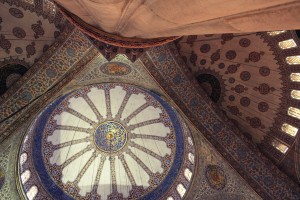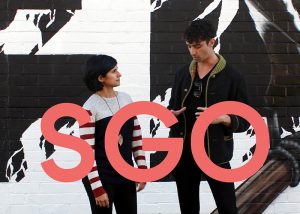Part two of six of my musings from the one month Muslim World Study Tour with Griffith University to Malaysia, Turkey, Spain and Morocco. Here are my thoughts on religion and society…

The National Mosque in KL
Religion is at the heart of many societies and occupied a particularly interesting place in Malaysia. If you are an ethnic Malay person, you are, by law and definition, a Muslim. Once you have this title, it is almost impossible to revoke, unless you also revoke your ethnicity (think about it…). Because of this, I feel that Islam has a unique position in Malay society. While it is deeply personal, sacred and important to varying degrees throughout society, it is also highly institutionalised. This is mainly because it has been so heavily adapted into law, politics and society – regimented almost – that in my eyes it is more institutionalised, less personalised. If you are made to follow something without choice, does that make it less genuine? My feeling for Malaysia is – yes.

Inside the Pink Mosque, KL.
We were able to talk to the former Prime Minister Tun Dr Mahathir Mohamad on the Islamisation of Malaysia, and I think although he didn’t cover my interest in the institutionalised side of religion, he did have a few interesting things on the topic to comment on. Tun (an honorary title given to only the most valued and prestigious of society) stated that Malaysia is as Islamic as anywhere can be, yet he believes that the problems with Islam and society rest where Muslims think more about the interpretations of their religion as the only way. He has a problem with Malays who generally follow religion and religious leaders without question. For Mahathir, he believes that Malay society needs to go back to the origins of Islam and try to understand the message from the source – the Qu’ran. The gist of the argument is that religion in general and Islam in particular is not about dealing with the hereafter, but the ‘here now’.

Inside the Blue Mosque in Istanbul.
A secular state with an Islamist government, Turkey to me represents a country where a less-regimented, more genuine, and more organic form of religion is practiced. It is a country where religion is playing a positive impact, particularly with the success of the Justice and Development Party (AKP) which has been in government for over ten years now. Unlike Malaysia, where there has been a revitalisation of the wearing of the veil since the 70s and 80s, traditional dress is less observed and the religiosity of society seems firmly imbedded grassroots connections. Although 99.8% of the population are Muslim (majority Sunni), it is not an in-your-face, over-the-top or scary Islam, like many of Australian and international news media outlets would have you believe. Islam simply is, with no extra attention, pomp or parade made.
Another secular nation, religion in Spain was less conspicuous, regarding religion, than previous places. As we were located next to a central cathedral in Granada we did hear the church bells go off quite regularly, but religion didn’t appear to be as neatly integrated into society. Since the 1942 Christian take-over of Muslim Spain, as well as the

Spot the mosque! Grand Mosque in Granada
Inquisition, Islam has had a low presence among the Spanish population but is finally gaining some ground, with most Muslims in Spain being native Spanish citizens, not immigrants. We visited the Granada Mosque, which had just held its 10th birthday last year and was smoothly interwoven into the old city neighbourhood overlooking the Alhambra – white-washed walls, red terracotta roofs, discreet minaret and all. We were able to meet with the Mezquita Mayor de Granada, Abdul Hakim Praena, who shared a story I that I think sums Islam up well in Spain. He said that normally mosques do the call to prayer five times a day, starting at 6am. Normally loud enough to reach the neighbouring areas, they got approval from everyone to start the call to prayer early each morning. Instead they decided not to broadcast the dawn call to prayer out of respect for their neighbours’ sleep – they embodied a care for thy neighbour approach, and received full thanks, respect and understanding in return. Care, respect and understanding – that is what religion is about.

Rural Morocco life.
And finally in Morocco, the Professor Abdelhaj Moudden at the School of Governance and Economics in Rabat, had some interesting stories regarding the revival of religion and the cause/effects on society. He recalled one story which stuck with me. In the 1970s when the Professor was a student, he and his classmates lit up cigarettes in the month of Ramadan while they were in class to aggravate the lecturer. This distressed the lecturer, who responded haven’t you any respect for your religion? Forty years later, Abdelhaj Moudden is a lecturer himself. Earlier this year, he had a class in which the students asked for the class to be moved from 9am-12pm to 8am-11am so that they would have time to attend prayer on Fridays. He responded, haven’t you any respect for your education?

Small religious building and graveyard by the beach in Rabat.
It was an interesting story as it reflected the changes that are being made in society regarding religion, education, modernity and different streams of thought. Speaking on why he thought the Marxist paradigm and anti-establishment, anti-religious thought of the 1970s had faded, he stated that it didn’t answer the need of society. Using the example of medicine, he said that when modern medicine came to Morocco it was fantastic, it was just what the people needed and it increased health and survival rates exponentially. However the failure of modern medicine was being witnessed whereby Morocco sits between two worlds – there is a lack of all the modern medicine and equipment that is needed to sustain modern medicine, and so this has led to a lack of faith in modern sciences and a renewed interest and reversion to traditional medicine. Likewise, I think this is a metaphor for the state of religion in Morocco. The Western modern thought that was so popular in the 1970s could not bridge the gap in human experience, and thus religion in Morocco has since been revived.
Keep tuned – 4 more blogs are on their way! ![]() These blog pieces are part of my assessment for the course.
These blog pieces are part of my assessment for the course.



